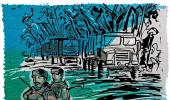Displaying 'ARMY' on private transport is an attempt to milk the respect and reverence that the common citizen has for a person in the armed forces, observes Colonel K Thammayya Udupa (retd).
By writing 'ARMY' and displaying regimental insignias, we expect a few misdemeanours to be overlooked.
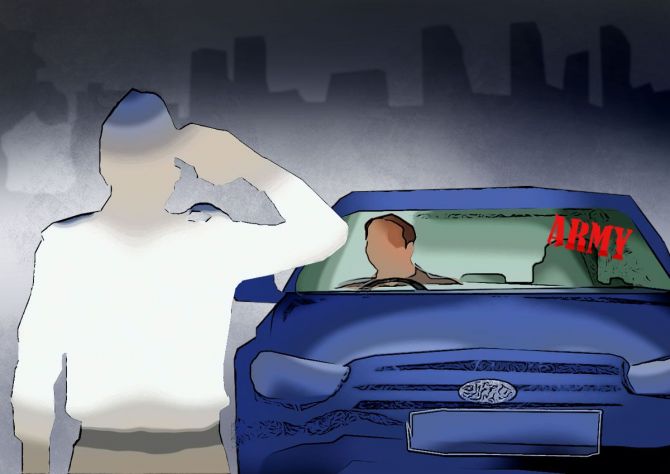
Many years back while I was driving on a highway my vehicle was flagged down by a traffic police squad for a routine check.
I was asked to show my driving licence, the registration certificate of the vehicle, its insurance certificate and the PUC (Pollution Under Control( certificate.
The traffic police inspector went through the documents in a professional manner.
Having satisfied himself that all documents were in order, he respectfully handed them back to me and asked me, "Sir, are you an Army man?"
"I am a retired Indian Army officer," I replied proudly.
"Then, Sir," he told me, "You should have painted the word 'ARMY' on your vehicle. We would not have stopped you."
"But that would be incorrect, as this is my personal vehicle and not an Army vehicle," I countered him.
"No Sir, it is not incorrect. All armed forces personnel display 'ARMY' on their vehicles," he insisted and continued, "We traffic policemen are always on the road and we see a large number of vehicles everyday with 'ARMY' written on their windscreens in case of four wheelers and somewhere prominently in case of two-wheelers."
"I am sure that writing 'ARMY' on private vehicles is incorrect, because while I was in service, I had seen a letter clearly prohibiting the display of 'ARMY' on private vehicles", I emphasised. But since it did not cut much ice with the police inspector, I was soon on my way.
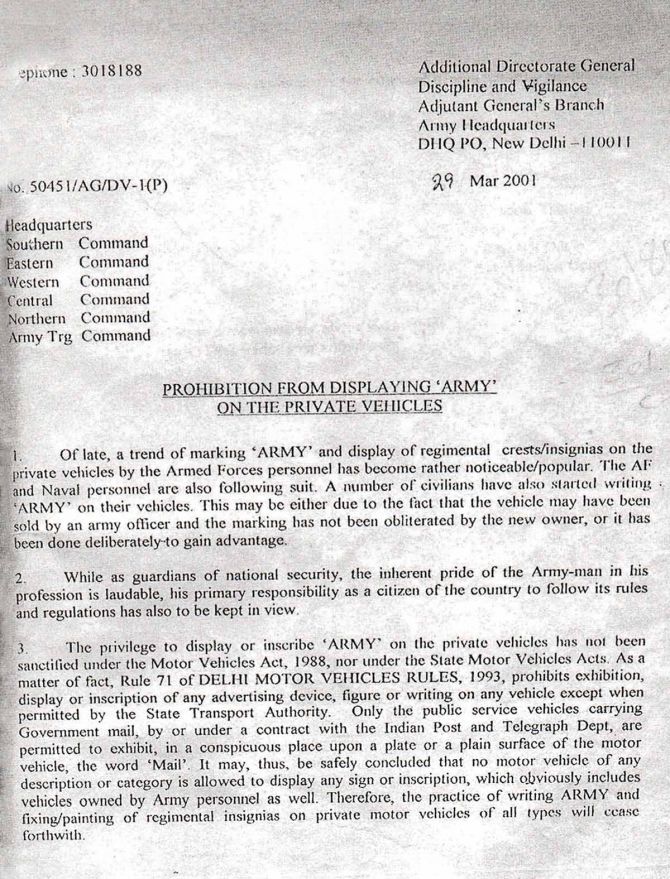
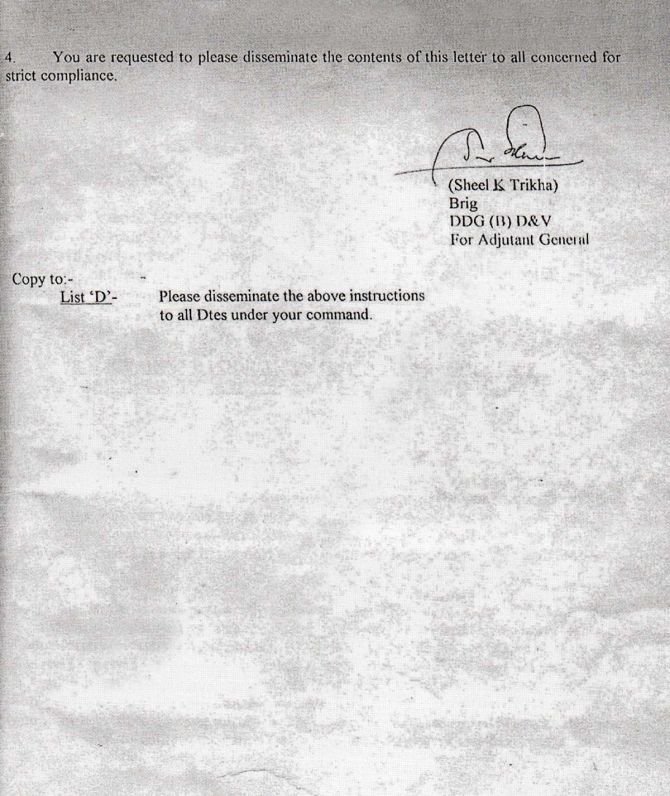
I was referring to the Army Headquarters Adjutant General's Branch Additional Directorate General Discipline and Vigilance letter number 50451/AG/DV-1(P) dated 29 March 2001 - 'Prohibition from displaying 'ARMY' on the private vehicles.'
The above letter, a copy of which was obtained by me recently under the provisions of the Right to Information (RTI) Act, 2005 and which is still in vogue -= that is, it has neither been cancelled, nor been amended nor superseded -- mentions:
'Of late, a trend of marking 'ARMY' and display of regimental crests/insignias on the private vehicles by the Armed Forces personnel has become rather noticeable/popular. The AF and Naval personnel are also following suit. A number of civilians have also started writing 'ARMY' on their vehicles. This may be either due to the fact that the vehicle may have been sold by an army officer and the marking has not been obliterated by the new owner, or it has been done deliberately to gain advantage.'
The letter goes on to specifically lay down:
'...the practice of writing 'ARMY' and fixing / painting of regimental insignias on private vehicles of all types will cease forthwith.'
I do recall that soon after the letter was issued a drive had been undertaken in Delhi Cantonment by the Corps of Military Police to stop all vehicles on which 'ARMY' was displayed.
Not only were the vehicle owners educated about the contents of the letter, but the displayed word and regimental insignias were removed on the spot.
I also recall that the contents of the letter did not go down too well with a large number of service personnel. It was construed as a privilege being withdrawn.
However, in reality, no such privilege existed.
What are the so-called 'privileges' that display of 'ARMY' which are assumed to have been conferred on a private vehicle?
As we all know, the armed forces are held in high esteem by the common citizen of India.
Displaying 'ARMY' on private transport is an attempt to milk the respect and reverence that the common citizen has for a person in the armed forces.
By writing 'ARMY' and displaying regimental insignias, we expect a few misdemeanours to be overlooked.
Like parking the vehicle in places where it is prohibited; avoiding payment of parking fees; getting away even if not in possession of the valid documents; expecting to be excused when apprehended for jumping traffic lights and so on.
In addition to all these, by displaying 'ARMY' some drivers expect the vehicle to be allowed to pass through toll gates on highways without payment of the toll taxes.
It is rather unfortunate that even many senior officers are guilty of either not knowing that 'ARMY' should not be displayed on private transport, or for persisting with it knowing fully well that it is an incorrect practice.
I live in a small town in coastal Karnataka where there are not very many people serving in the armed forces.
Yet there is a disproportionately high number of private vehicles with 'ARMY' displayed on them.
To my dismay, I have generally found that in almost all cases the owner is never from the army, but a relative or acquaintance of some army person.
When I ask them why then do they have 'ARMY' displayed on their vehicle, I have been offered the weirdest of explanations:
"When he comes here to visit us, he travels in this vehicle."
"He has allowed us to do so, because we are from the same family."
"Our daughter is in NCC."
While these may seem amusing, let us not brush the security implications under the carpet if this practice remains unchecked.
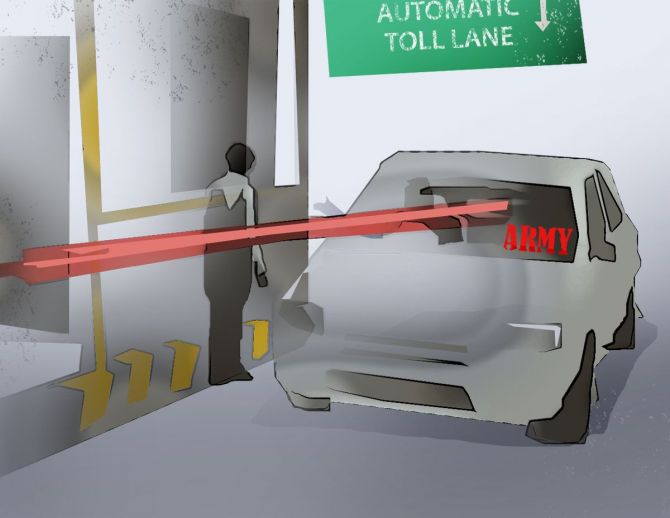
In a large number of government establishments, the security apparatus is not very tight.
In fact, it is true even in the case of a few military establishments.
The sentries at the gate get overawed by persons who have an imposing personality, some bluff and bluster and "Don't you know who I am?" type of attitude.
Such people arriving at an establishment main gate in a vehicle displaying 'ARMY' have very bright chance of gaining access there.
My experience with the traffic policeman cited at the beginning of this piece itself highlights how even personnel from the law enforcing arm of the State may be willing to let such vehicles pass without much scrutiny in the mistaken belief that it is a sign of respect for the armed forces personnel.
To repeat, if left unaddressed, this can have disastrous consequences in the future. So, what should be done?
At the outset, we need to accept that this is a problem and this needs to be tackled in a systematic manner.
There is a need to follow a three-pronged approach.
Firstly, in-house within the three services. Though the letter referred to above was issued way back in 2001, the contents are followed more in the breach.
Walk into any cantonment today and you will find most of the private vehicles of serving armed forces personnel displaying 'ARMY' and also a bewildering variety of regimental insignias.
This needs to stop immediately.
For this to happen, the senior officers should lead by example and ensure that their own vehicles follow the contents of the letter in letter and spirit.
The station commanders of all military stations should ensure that periodic unit-wise checks of all private vehicles are carried out in their respective areas of responsibility.
All unit commanders should educate their men in this regard during the monthly Sainik Sammelans.
They should also be advised not to allow any of their friends and relatives in their home towns to display 'ARMY' on their vehicles.
Secondly, the armed forces should take up the matter through the police and road transport authorities of all states and union territories.
Sub-section (1) of Section 127 of The Karnataka Motor Vehicles Rules,1989 lays down:-
Prohibition of painting or marking etc:
1. No advertising device, figure, or writing shall be exhibited on any transport vehicle save as may be specified by the Regional Transport authority by general or special order.
As there is no general or special order issued by the regional transport authority in Karnataka permitting the writing of 'ARMY' (or 'EX-ARMY') on a private vehicle, it implies that any such writing is a violation of the law of the land.
Similar sub-sections exist in the motor vehicle rules of almost all the states in India. Therefore, it follows that it devolves on the respective authorities in the states to weed out this practice.
It would be foolhardy to expect the authorities at the state level in all states, to act upon this in unison, all of a sudden now, after they have been lax on this matter all these years.
The entire exercise is likely to remain a non-starter. But the armed forces should persist and keep this issue alive till the problem exists.
Finally, I recommend that a concerted social media public awareness campaign should be conducted to sensitise the common citizen of the likely damaging consequences of displaying 'ARMY' and regimental insignias on private transport.
The campaign should appeal to the nationalistic feelings of the common citizen who is made to feel, 'I love my India and I will not display 'ARMY' on my personal transport.'
Colonel K Thammayya Udupa (retired) is a B Tech (Electrical) from KREC (now NITK) Surathkal. He was commissioned into the Corps of Engineers (The Bombay Sappers) in December 1982. He commanded a RAPID Engineer Regiment and took premature retirement from the Indian Army in April 2007.
Post retirement he served in the Indian Institute of Management-Indore.
He lives in Udupi-Manipal and can be contacted at ktudupa@gmail.com
Feature Presentation: Rajesh Alva/Rediff.com




